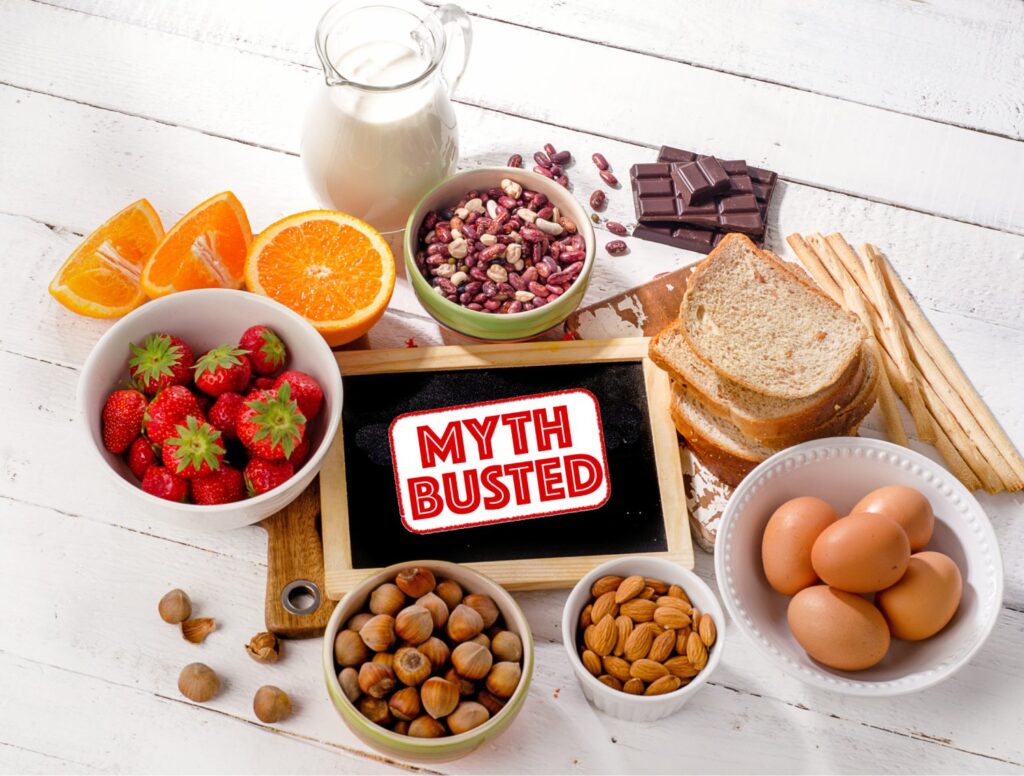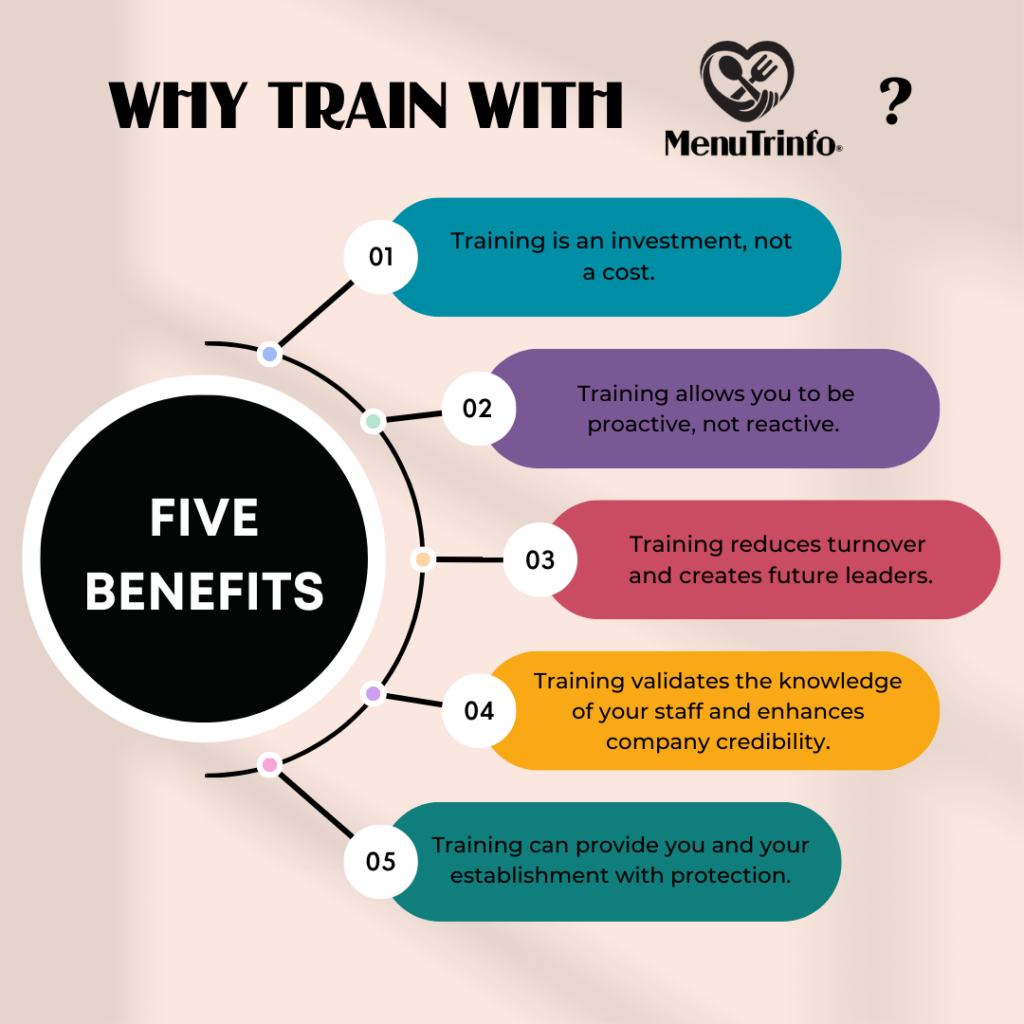
MenuTrinfo is the food service industry’s leading resource for allergen-free certifications, nutritional information, allergen chart creation, as well as allergen and gluten-free training. It has always been our goal to support the allergen and gluten-free community by providing potentially life saving information. It is time for us to set the record straight and bust some of the most common food allergy myths!
- Myth: Wheat-Free means Gluten-Free
Not necessarily! Gluten is a protein that is found in wheat, but is also in barley, rye, and other grains. So it’s possible for something labeled wheat-free to still contain other sources of gluten.
- Myth: All Tree Nuts Are Created Equal!
Despite an allergy to one specific tree nut, this does not necessarily mean an individual is allergic to other tree nuts. However, certain tree nuts are closely related, including cashew with pistachio and pecan with walnut.
- Myth: Allergy to peanuts means there is also an allergy to peanut oil
Refined peanut oil will not cause allergic reactions for the overwhelming majority of people who are allergic to peanuts and if anyone does suffer a reaction, it is likely to be mild. However, unrefined (crude) peanut oil is far more likely to cause a reaction. The FDA exempts highly refined oils from being labeled as containing allergens. Studies show most allergic individuals can safely consume oil that has been highly refined (not cold pressed, expeller pressed, or extruded) because the allergenic protein does not exist.

- Myth: Lactose-Free means Dairy-Free
If a product is labeled lactose-free, that does not mean it is necessarily dairy-free. Lactose is a type of sugar, so lactose-free products do not contain the specific sugar, but are still made from real dairy.
- Myth: If there wasn’t a food allergy reaction initially, there won’t be an allergic reaction.
Some allergic reactions may take up to an hour to occur. You also may not be in the clear even if you’ve recovered from an allergic reaction. There is also the possibility of a secondary or biphasic reaction. This can occur up to eight hours after initial exposure to the allergen.
- Myth: Once an allergy, always an allergy!
Every allergic event is unique and every food allergic person is unique. As a person grows, their body develops and their immune system along with it. This means that food allergies can lessen in severity, stay the same, or even develop as a completely new allergy throughout someone’s life. Yes, that means you can become allergic to something you were not allergic to prior!
For instance: An egg allergy can be outgrown and is one of the least common food allergies in adults. A milk allergy can be outgrown but is still prevalent in adults. Shellfish allergies can get worse as one gets older. Peanut and tree nut allergies are generally the most common in kids and adults.
- Myth: Training is too expensive (Think about it like this: Training cost vs. Cost of a Lawsuit)
The cost of training your team can range from tens to hundreds of dollars vs. the average cost of a lawsuit to address a food allergic event of $50,000 – $100,000. Compensation depends on the severity of the event.

- Myth: Soft claims cover all the legal bases (certified cost vs. recall cost)
Soft claims seem to be enticing to add to a package label. But, there is rarely proof and even processes in place to support those claims. The cost of certifying a product as free from specific allergens could cost a company a few thousand dollars. But, if a recall happens because a soft claim was not supported by the product actually being free from the allergen, it could cost the company millions with the possibility that the company may not recover from the event. We always say, soft claims means hard trouble.
- Myth: Sanitizer cleans up allergens
They kill GERMS, not allergens! Food allergens are proteins. Sanitizers do not kill or denature proteins. The protein needs to be physically removed from the surface. When diners inform you that they have a food allergy, offer to re-clean the table using a clean cloth with hot, soapy water and finish with sanitizer. Do not use gel hand sanitizer to clean your hands after allergen contact. Use soap and water or a packaged hand wipe. Clean and sanitize utensils and surfaces before preparing an “Allergy Alert” meal or item. Don’t make a FATAL mistake. Always clean and then sanitize every surface prior to allergen-free prep.
- Myth: Allergens can be cooked out of food
Think again! Cooking does not reduce or eliminate food allergens! Allergens are heat stable, and therefore cannot be destroyed by normal cooking temperatures. Allergen residues on cooking equipment that remain after being cooked, baked or boiled can still cause allergic symptoms and reactions.
If your allergen safety program includes or involves any of these myths, let us help you! AllerTrain is here to train and support your team and our Onsite team can follow up your efforts to ensure allergen safe practices are in place and your facility is ready to go!

About MenuTrinfo®:
MenuTrinfo® is a company dedicated to ensuring safe food service by providing allergen and nutritional information, as well as programs such as Certified Free From™, AllerTrain® and a wide variety of services for colleges, universities, manufacturers of consumer-packaged goods, and more. We excel in employee food allergy training and certification, as well as food safety guidance and menu consulting. MenuTrinfo® has become a trusted partner for food service partners and manufacturers across the United States, and the company’s mission is to protect lives and make dining experiences as safe as possible for those with allergy restrictions.



